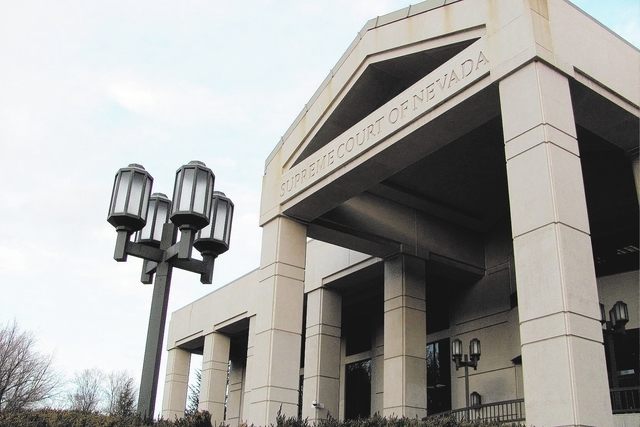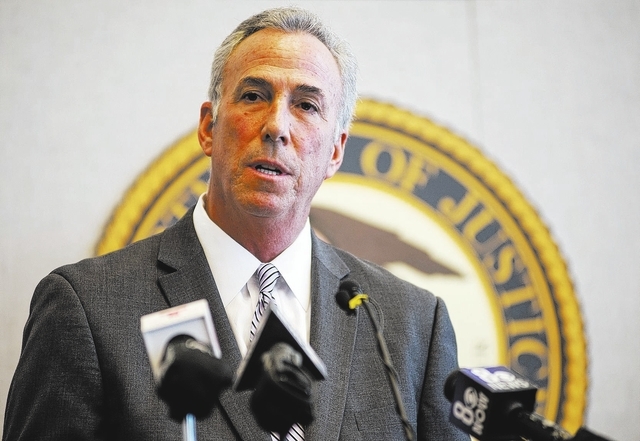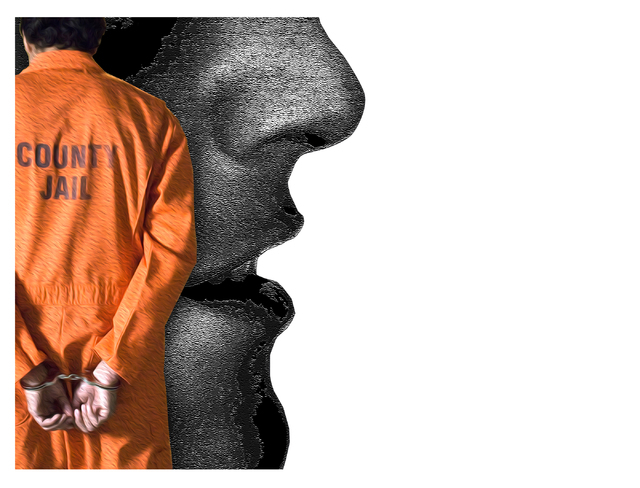DA criminal informant safeguard rarely used in Clark County, records suggest
In 2008, the Clark County district attorney’s office created a database to assure lawmakers that prosecutors would be upfront about deals made with criminals in exchange for their testimony.
The idea was that prosecutors would log an entry in the inducement index every time they bargained with an informant, creating a central record that might prevent justice from being derailed because one prosecutor knew something another didn’t.
Those deals are done all the time in the court system: cut one criminal some slack in return for information or testimony about another one accused of something far worse. It’s considered a necessary evil, but there’s always risk. What if a lie in exchange for a deal causes someone else’s wrongful conviction? What if a deal puts a criminal back on the street to commit more crimes?
Giving that information is required under the Constitution. Knowing if a witness has been given something of value in return for testimony is crucial in arguing a case, but the DA’s office hadn’t always been forthcoming.
The district attorney’s office already had come under fire for failing to share information with defense attorneys. Four years before, a federal judge had criticized Clark County’s procedures for sharing information with defense attorneys after reviewing a string of cases cited by the federal public defender’s office.
The new inducement index, lawmakers were told in 2008, would prevent those problems without the need for new laws. After the district attorney’s office pitched the concept of the inducement index to the Legislature’s advisory commission on the administration of justice, the matter didn’t come back up.
But the Legislature had reason to worry.
After six years of use, the inducement index has just 130 entries — a figure defense attorneys consider laughably low considering that roughly 330,000 criminal cases were prosecuted in Clark County over that time.
Tod Story, executive director of the American Civil Liberties Union of Nevada, said the system seemed “woefully inadequate” considering the number of entries and the email reminding prosecutors about the inducement index’s existence.
“They are reminding people because people have forgotten,” Story said. “If the information can’t be relied upon, then what good is its existence?”
The public needs to have confidence in how prosecutors handle informants, Story said.
“If the system is proposed by the very people who maintain it and they police themselves, how can you rely on that system? No one can rely on that system. Certainly not the defense. Certainly not the public,” Story said.
The district attorney’s office declined to speak with the Las Vegas Review-Journal about the inducement index or a related case management system, citing the paper’s lawsuit seeking public records from the office.
But other records obtained by the Review-Journal indicate that prosecutors aren’t being diligent in using the index.
BEGGING FOR COMPLIANCE
In November 2013, Chief Deputy District Attorney Thomas Carroll emailed a reminder to all prosecutors:
“Seems like it’s time for a little reminder about the inducement index,” he wrote. “I received a stream of emails to make entries into the index after my last reminder. But, the stream has dried up. So, either no inducements are being given or else people are forgetting about the index.”
It’s unclear what, if anything, the office does to make prosecutors follow its own procedures or live up to the obligation to disclose deals to defense attorneys.
In 2008, lawmakers were also assured that a new case management system would alleviate problems with withheld information.
The district attorney’s office said the same thing in 2014, after prosecutors discovered evidence — a detective’s notes — that exonerated a man only hours before his trial was to start. They acted in the interest of justice and dropped the case after having the man take a lie detector test, but questions lingered about evidence that had gone overlooked for so long.
Victor Villalta, 29, had been accused of sexually assaulting two girls. He had spent years on house arrest, couldn’t hold down a job, delayed starting a family and lived under the constant threat that he could be sentenced to life in prison.
At the time, Assistant District Attorney Christopher Lalli said there had long been problems with getting evidence to defense attorneys, attributing the problem to to an archaic, paper-driven process.
That electronic case management system, first promised in 2008, is expected to be in place in spring 2017, Clark County spokesman Erik Pappa said.
It’s unclear if the inducement index is designed to be limited to only criminal informants or if any witness should be included. At times the district attorney’s office has characterized the database as limited to criminal informants. But Carroll’s 2013 email to staff explains that any witness given money to cover rent or other benefits should be noted in the index.
Nearly a year ago a judge, in response to a Review-Journal lawsuit, ordered the district attorney to release dozens of records about payments to witnesses in criminal cases. The order followed a series of RJ articles about failure to disclose the information to defense attorneys. Those stories prompted District Attorney Steve Wolfson to say his office would start disclosing the payments to defense lawyers.
But the actual inducement index remains under wraps.
District Judge Susan Scann last April initially ruled the Review-Journal should have access to information about 12 entries in the index related to cases in which the witness already had testified. But she amended that ruling after the district attorney’s office argued that animosity toward informants is so great that making the names public would endanger them, though they already had testified in open court in front of the defendant. Under the judge’s amended ruling, the district attorney could limit the records to ensure that none of the 12 would be identifiable.
The Review-Journal has yet to receive information about the inducements given.
INCREASING SCRUTINY
The ramifications of prosecutors who don’t play by the rules can go far beyond the case at hand. They can lead to costly delays and confusion in the court system, anguish and doubt for victims, and otherwise solid convictions being overturned.
Prosecutors nationwide have come under increased scrutiny since the advent of DNA testing has led to a rise in exonerations and the Innocence Project has scoured wrongful conviction cases to find where things went wrong.
Despite a U.S. Supreme Court mandate — Brady v. Maryland — problems with hidden evidence persist.
“There is an epidemic of Brady violations abroad in the land,” Alex Kozinski, a judge on the 9th U.S. Circuit Court of Appeals, which hears Nevada cases, wrote in 2013. “Some prosecutors don’t care about Brady because courts don’t make them care.”
It’s rare for a prosecutor to face any consequences for hiding information.
Alexandra Natapoff, an associate dean at Loyola Law School who studies the use of informants, said more and more attention is being paid around the country on prosecutors and handling of informants.
“It is becoming increasingly clear how risky and problematic the use of informants is. We rely heavily — and in some cases exclusively — on prosecutors to make sure the system doesn’t lose its way when it compensates criminals for testimony,” Natapoff said. “Prosecutors need to turn over information on informants to the defense not just because it is constitutionally required but so the adversarial system can do its job.”
In California, a scandal has led to new legislation. The Orange County district attorney’s office was accused of running a secret jailhouse informant network and failing to disclose evidence. Cases have collapsed, a judge booted the entire office from one case, and a panel in January offered a scathing report that found prosecutors had a “win at all costs” mentality, according to news reports.
In October, California lawmakers approved legislation that strengthens a judge’s ability to toss a prosecutor off a case for withholding evidence and requires judges who find a prosecutor has hidden evidence to report the incident to the State Bar.
“The (law) seems like a step in the right direction,” Kozinski told The Huffington Post. “It seems to give a great deal of discretion to trial judges, so its effectiveness will depend on the degree to which those judges are willing to exercise that authority.”
ERRORS DIFFICULT TO FIX
It’s likely Nevada will see new rules, if not laws, on how prosecutors must share information.
In 2015, the Nevada Supreme Court formed a commission to look at the rules of criminal procedure.
“I think that it’s fair to say there are legitimate disputes about discovery in the state,” Nevada Supreme Court Justice James Hardesty said. “I think that the court recognized this as a concern in the criminal procedure area and that’s why the committee was created.”
Hardesty, is on the Legislature’s advisory commission on the administration of justice. He was also on the committee in 2008, when the district attorney’s office brought up the inducement index. Hardesty said it would be reasonable for the commission to revisit the issue it shelved after the district attorney promised to start its inducement index and improve case management.
Hardesty said it’s understandable why someone might question why the index has only 130 entries.
Hardesty said as the Supreme Court justice on the Legislature’s advisory commission on the administration of justice he will want to coordinate the Supreme Court’s rule-making process with the Legislature.
“Experience tells us certain changes and improvements are needed without waiting for the Legislature to confer,” Hardesty said, noting its possible new rules of criminal procedure will adequately address discovery problems, which he said come in front of the justices often.
The Nevada Supreme Court last year ordered a new hearing in a 1994 murder case involving a jailhouse informant who said he lied after being coached by detectives on his original testimony and twice was given money to visit his ailing father in Ohio. Defense attorneys say the benefits given to this key witness, if true, remained secret from then 19-year-old DeMarlo Berry and the jury who convicted him.
Berry, now 41, was convicted of killing Charles Burkes, a Carl’s Jr. restaurant manager, during a robbery at the fast-food joint.
The Rocky Mountain Innocence Center, which represents Berry, also argued forgery charges against the informant were dismissed, though prosecutors said the charges did not disappear because of the informant’s cooperation.
The opinion issued by a three-member panel of justices said District Judge Michael Villani erred in denying a hearing to review new evidence supporting Berry’s claim that he was not the killer. Berry’s attorneys also told the court a gang member serving a life sentence in California confessed to the killing.
The district attorney’s office has disputed the Innocence Center’s claims, arguing that the new evidence, if true, would not change the outcome of the case.
It’s crucial for defense attorneys to have all the information about an informant witness before trial because once they testify it’s much harder to correct a mistake, said Jensie Anderson, legal director for the Rocky Mountain Innocence Center.
Before trial, a person is innocent until proven guilty, but after conviction, that burden of proof shifts to the defendant. Even if a defendant can prove a mistake was made, the court has to find that the mistake mattered.
“I don’t think creating another level of bureaucracy is a way to solve this problem. The way to solve this problem is to make sure that prosecutors are completely open with what their witnesses receive,” Anderson said. “Everyone knows incentivized witnesses lead to wrongful convictions. I think we can all be on the same page to fix that. This inducement index is not the answer.”
Contact Bethany Barnes at bbarnes@reviewjournal.com or 702-477-3861. Find her on Twitter: @betsbarnes
































